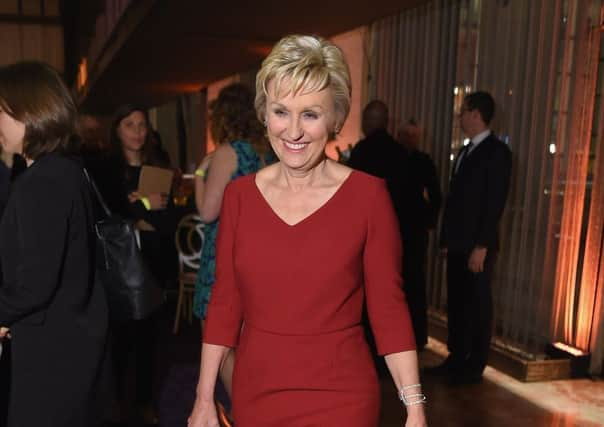Ruth Davidson: Women are taking on male global elite at Davos


THE annual World Economic Forum, which gathers in Davos this week, inspires plenty of well-merited cynicism. Every year, the forum plays host to world’s plutocrats, political leaders and corporate executives who, between them, control the world’s purse strings.
Gathered in luxury behind security cordons, 1.5 kilometres above sea level, they appear to provide a perfect expression of aloof, globalized privilege, out of the reach of ordinary people, down below.
Advertisement
Hide AdAdvertisement
Hide AdThis week, I have the chance to see for myself, having been invited to speak at a fringe event near the forum, organised by Women in the World, a leading global platform for women who are creating change. And bear with me while I put the cynicism to one side and make the case that this example demonstrates that some good does indeed come out of Davos’s annual jamboree.
Women in the World is the brain-child of Tina Brown, the remarkable British-born journalist who, at the age of 25, became editor-in-chief of Tatler, before crossing the Atlantic to rescue Vanity Fair and, subsequently, to edit the New Yorker.
These days, she has put her energy behind promoting the role of women in business, politics and humanitarian work. It is entirely non-political: both Nicola Sturgeon and I have spoken at events with Tina in the recent past.
Last night, it was my honour to be the keynote interview at the Women of Impact dinner in Davos alongside Dr Rola Hallam, a British-Syrian doctor who, after treating the wounded in the Syrian war, founded CanDo, the world’s first crowd-funded humanitarian aid platform.
As with all such events, the aim is to demonstrate how women around the world are illuminating pressing international issues. Last night’s event was an opportunity to focus on the role of women to an audience made up of some of the world’s most important policy makers and corporate executives.
Is all this necessary? Given the prominence of women in public life, both here in Scotland and in the UK, do we really need organisations like Women in the World to stress the need for gender equality and women’s rights? The answer is a resounding yes – and no more so than when directed at the very corporate world that Davos brings together.
Because we have a problem: far too many women are still excluded from the key financial institutions and large firms that control so much of our world. Among CEOs of the biggest companies in the UK and the US, there are more men named John than women of any name, according to Catherine Mayer, co-founder of the Women’s Equality Party.
Leave aside the injustice of gender imbalance for a moment, this has an impact on the bottom line as well. Analysis by Credit Suisse has shown that companies which put women in decision-making roles are more profitable. That’s because firms with a gender balance tend to be take more rounded, less risky, decisions. How might that have impacted on the way we run the global order? As Christine Lagarde, the head of the International Monetary Fund, has mused: “If Lehman Brothers had been Lehman Sisters, today’s economic crisis clearly would look quite different.”
Advertisement
Hide AdAdvertisement
Hide AdIt’s a view backed up by VirginMoney UK’s chief executive Jayne-Anne Gadhia. In 2016, she was asked by the then Chancellor George Osborne to lead a review of women in finance. A sceptic herself, who “never wanted to get involved” on gender equality issues, Gadhia spoke late last year about how she has now reached the view that gender imbalance in the corporate world is a core reasons behind low productivity in the UK.
“Organisations that have balanced gender teams drive better return on equity than those that don’t,” Gadhia said.
So what needs to happen? The misplaced assumption is that women are prevented from getting on by biology. Motherhood gets in the way, and there isn’t much anyone can do about that. But this, as Gadhia points out, is “nonsense”.
The real point for her is that too many workplaces are set up culturally to make it difficult for those women who have to juggle family responsibilities. So the key therefore is to move to a more flexible workplace.
Technology now exists to ensure people – women and men – can often work from home. They don’t need to be in the office at seven every morning. “Value me by output – don’t always expect me to be here because sometimes I do have caring responsibilities,” Gadhia added.
Companies across the UK and the world are making great strides in recognising these points – and in understanding that it is in their own self-interest to do so. After all, what kind of ambitious firm sets itself up to only hunt for talent from 50 per cent of the population?
However, as the statistics prove, we still have a huge distance to travel.
Part of that journey means speaking to the people who run the world and who, for better or worse, are gathered in Switzerland this week. Women like Tina Brown won’t make any difference by staying away and sneering: instead, they are seeking to influence and to impact the world we live in. For that, she deserves huge credit.
Advertisement
Hide AdAdvertisement
Hide AdJust because so much power today is held at the global level, it doesn’t mean that there is no way to change things for the better. If Davos helps in some way to bring about that change, then – hold the cynicism for a second – it may just be worth it.
